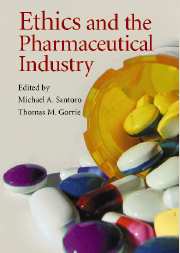Book contents
- Frontmatter
- Contents
- Tables
- Figures
- About the Editors
- Contributors
- Preface
- Acknowledgments
- Foreword
- Introduction: Charting a Sustainable Path for the Twenty-First Century Pharmaceutical Industry
- PART I PROFITS, PATIENTS' RIGHTS, AND SCIENTIFIC PROGRESS: THE ETHICS OF CLINICAL RESEARCH CONDUCTED IN PRIVATE ENTERPRISES
- Introduction to Part I
- 1 Drug Research: Between Ethical Demands and Economic Constraints
- 2 Emerging International Norms for Clinical Testing: Good Clinical Trial Practice
- 3 The Regulatory and Ethical Challenges of Pediatric Research
- 4 Including Children in Research: Participation or Exploitation?
- 5 Racial and Ethnic Inclusiveness in Clinical Trials
- 6 The Rights of Patients to Participate in Clinical Research
- 7 How Should Government Regulate Stem-Cell Research? Views from a Scientist-Legislator
- PART II MARKETING AND THE EFFICIENT UTILIZATION OF HEALTHCARE RESOURCES: ETHICAL AND PUBLIC POLICY CHALLENGES
- PART III PATENTS, PRICING, AND EQUAL ACCESS
- PART IV CONCLUDING THOUGHTS: CHARTING A SUSTAINABLE PATH FOR THE TWENTY-FIRST CENTURY
- Notes
- Index
4 - Including Children in Research: Participation or Exploitation?
Published online by Cambridge University Press: 04 December 2009
- Frontmatter
- Contents
- Tables
- Figures
- About the Editors
- Contributors
- Preface
- Acknowledgments
- Foreword
- Introduction: Charting a Sustainable Path for the Twenty-First Century Pharmaceutical Industry
- PART I PROFITS, PATIENTS' RIGHTS, AND SCIENTIFIC PROGRESS: THE ETHICS OF CLINICAL RESEARCH CONDUCTED IN PRIVATE ENTERPRISES
- Introduction to Part I
- 1 Drug Research: Between Ethical Demands and Economic Constraints
- 2 Emerging International Norms for Clinical Testing: Good Clinical Trial Practice
- 3 The Regulatory and Ethical Challenges of Pediatric Research
- 4 Including Children in Research: Participation or Exploitation?
- 5 Racial and Ethnic Inclusiveness in Clinical Trials
- 6 The Rights of Patients to Participate in Clinical Research
- 7 How Should Government Regulate Stem-Cell Research? Views from a Scientist-Legislator
- PART II MARKETING AND THE EFFICIENT UTILIZATION OF HEALTHCARE RESOURCES: ETHICAL AND PUBLIC POLICY CHALLENGES
- PART III PATENTS, PRICING, AND EQUAL ACCESS
- PART IV CONCLUDING THOUGHTS: CHARTING A SUSTAINABLE PATH FOR THE TWENTY-FIRST CENTURY
- Notes
- Index
Summary
INTRODUCTION
The recent escalation in pediatric research, and thus the number of children exposed to research risks, raises concerns as to whether the ethical and regulatory framework for protecting children in research is adequate. What are the acceptable limits on the risks to which we should expose children for the benefit of others and society? To remain within these limits, the regulations and ethical guidelines on research involving children require careful interpretation and application. Are children truly research participants or are they merely being exploited for commercial gain? Research may be exploiting children if it does not result in publicly available knowledge regardless of the level of research risk exposure. We exploit children within research if we use them simply for the generation of profit or personal gain. The conduct of pediatric research is a privilege granted to us by the parents and children who willingly participate. The financial and professional benefits of performing this research reflect a social contract entrusting us with the future health and welfare of our children – a trust that requires transparency and full public disclosure of the research results.
This chapter (1) highlights important features of recent legislation to stimulate pediatric research; (2) reviews key elements of the U.S. pediatric research regulations, compared to guidance from the International Conference on Harmonisation (ICH), the Council for International Organizations of Medical Sciences (CIOMS), and the 2001 EU Clinical Trial Directive; (3) applies these guidelines to the choice of control group, illustrated by clinical trials of inhaled steroids in moderate asthma; and (4) briefly reviews the controversy over the use of antidepressants for major depressive disorder in adolescents.
- Type
- Chapter
- Information
- Ethics and the Pharmaceutical Industry , pp. 68 - 79Publisher: Cambridge University PressPrint publication year: 2005

